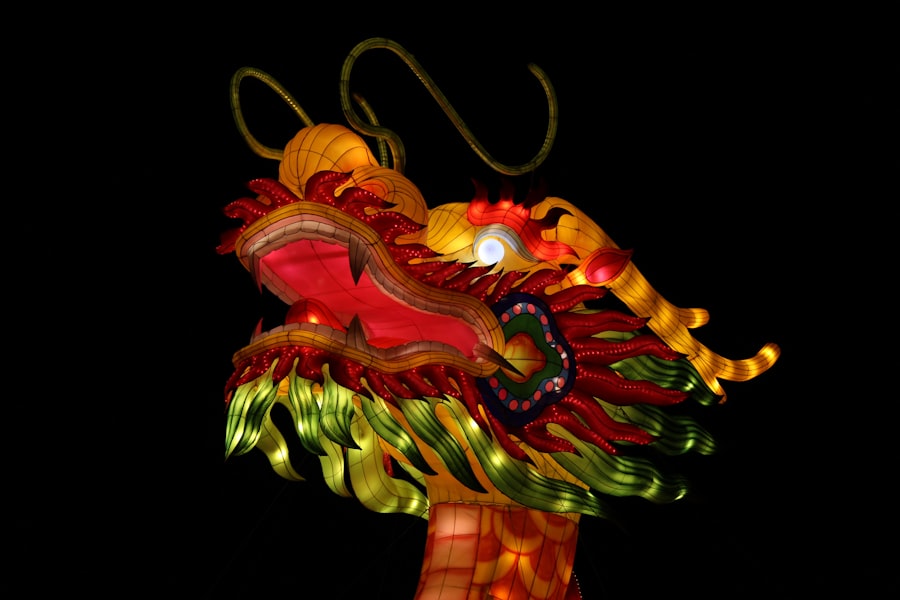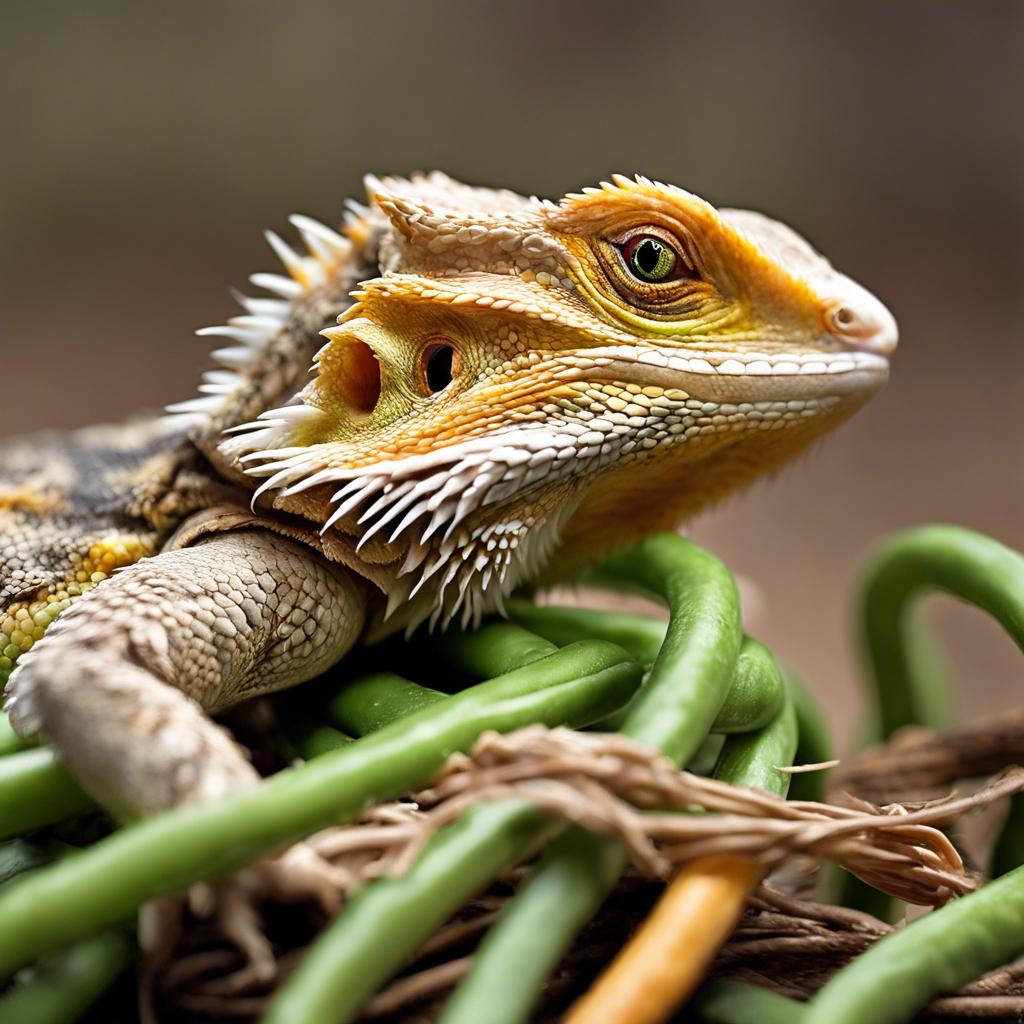Bearded dragons are popular reptile pets known for their unique appearance and docile nature. These lizards are native to Australia and have become increasingly popular as pets due to their low maintenance requirements and friendly demeanor. However, it is important to note that proper nutrition is crucial for the health and well-being of bearded dragons.
Key Takeaways
- Bearded dragons are popular pets that require a balanced diet to maintain their health.
- Vegetables are an important part of a bearded dragon's diet and provide essential nutrients.
- String beans are a nutritious vegetable that can be included in a bearded dragon's diet.
- String beans are high in fiber, vitamins, and minerals, making them a healthy addition to a bearded dragon's diet.
- While string beans can be fed to bearded dragons, it is important to prepare them properly and not overfeed.
Nutritional Requirements of Bearded Dragons
Bearded dragons are omnivores, meaning they require a combination of plant-based foods and insects in their diet. In the wild, they consume a variety of insects, fruits, vegetables, and flowers. It is important to provide a balanced diet that meets their nutritional needs.
A balanced diet for bearded dragons should consist of 70% plant matter and 30% insects. The plant matter should include a variety of leafy greens, vegetables, and fruits. The insects should be gut-loaded, meaning they are fed a nutritious diet before being fed to the bearded dragon.
Benefits of Including Vegetables in Bearded Dragon's Diet
Vegetables play a crucial role in the diet of bearded dragons. They provide essential vitamins, minerals, and fiber that are necessary for their overall health and well-being. Vegetables also help to maintain proper hydration levels and promote healthy digestion.
A vegetable-rich diet can help prevent nutritional deficiencies in bearded dragons. It can also help prevent obesity and other health issues that can arise from an imbalanced diet. Additionally, vegetables provide enrichment for bearded dragons by offering different textures and flavors.
Overview of String Beans
String beans, also known as green beans or snap beans, are a type of legume that is commonly consumed by humans. They are known for their crisp texture and mild flavor. String beans come in different varieties, including bush beans and pole beans.
Bush beans are compact plants that do not require support to grow, while pole beans are climbing plants that need a trellis or support structure. Both types of string beans are suitable for consumption and can be included in a bearded dragon's diet.
Nutritional Value of String Beans
String beans are a nutritious vegetable that can provide several essential nutrients for bearded dragons. They are low in calories and fat, making them a healthy addition to their diet. String beans are also a good source of vitamins A, C, and K, as well as folate and fiber.
In comparison to other vegetables, string beans are particularly high in vitamin K, which is important for blood clotting and bone health. They also contain antioxidants that can help protect against cell damage and reduce the risk of chronic diseases.
Can Bearded Dragons Eat String Beans?

Yes, bearded dragons can eat string beans. In fact, string beans are a good choice for bearded dragons due to their nutritional value and low oxalate content. Oxalates are compounds found in some vegetables that can bind to calcium and prevent its absorption.
String beans have a low oxalate content, which means they do not interfere with calcium absorption in bearded dragons. This is important because calcium is an essential nutrient for their bone health and overall growth.
Advantages and Disadvantages of Feeding String Beans to Bearded Dragons
Feeding string beans to bearded dragons has several advantages. As mentioned earlier, they are a good source of vitamins A, C, and K, as well as folate and fiber. They also provide hydration and promote healthy digestion.
However, it is important to note that string beans should be fed in moderation. While they are safe for bearded dragons to consume, they should not make up the majority of their diet. Variety is key when it comes to feeding bearded dragons, so it is important to offer a wide range of vegetables to ensure they receive all the necessary nutrients.
Preparing String Beans for Bearded Dragons
Before feeding string beans to bearded dragons, it is important to properly prepare them. Start by washing the string beans thoroughly to remove any dirt or pesticides. Trim off the ends of the beans and cut them into small pieces that are easy for the bearded dragon to eat.
It is recommended to lightly steam or blanch the string beans before feeding them to bearded dragons. This helps to soften the beans and make them easier to digest. Avoid adding any seasonings or oils, as these can be harmful to bearded dragons.
Other Vegetables Suitable for Bearded Dragons
In addition to string beans, there are several other vegetables that are suitable for bearded dragons. Leafy greens such as kale, collard greens, and mustard greens are excellent choices due to their high calcium content. Other vegetables that can be included in a bearded dragon's diet include bell peppers, squash, carrots, and peas.
It is important to offer a variety of vegetables to ensure that bearded dragons receive all the necessary nutrients. Rotate the vegetables regularly to provide different flavors and textures for enrichment.
String Beans as a Healthy Addition to Bearded Dragon's Diet
In conclusion, string beans are a healthy addition to a bearded dragon's diet. They provide essential vitamins, minerals, and fiber that are necessary for their overall health and well-being. String beans have a low oxalate content and do not interfere with calcium absorption in bearded dragons.
However, it is important to feed string beans in moderation and offer a variety of other vegetables to ensure a balanced diet. Proper preparation of string beans is also crucial to ensure they are safe for consumption. By including string beans and other vegetables in a bearded dragon's diet, owners can help promote their health and longevity.
If you're wondering whether bearded dragons can eat string beans, you'll find all the answers in this informative article from Reptile Wizard. They provide valuable insights into the dietary needs of these fascinating reptiles and discuss the safety and benefits of including string beans in their diet. To learn more about this topic, check out their article on “Can Bearded Dragons Eat String Beans?” by clicking here. While you're at it, don't forget to explore their other articles such as “Bearded Dragon Orange Around Eyes” and feel free to reach out to them through their contact page if you have any further questions or concerns.
FAQs
What are string beans?
String beans, also known as green beans or snap beans, are a type of vegetable that belongs to the legume family.
Can bearded dragons eat string beans?
Yes, bearded dragons can eat string beans as they are safe and nutritious for them.
What are the nutritional benefits of string beans for bearded dragons?
String beans are a good source of fiber, vitamins A and C, and potassium, which are all essential for the health of bearded dragons.
How should string beans be prepared for bearded dragons?
String beans should be washed thoroughly and cooked until they are soft. They can be served raw, but it is recommended to cook them to make them easier to digest for bearded dragons.
Can bearded dragons eat canned string beans?
Canned string beans are not recommended for bearded dragons as they may contain preservatives and added salt, which can be harmful to their health.
How often should bearded dragons be fed string beans?
String beans can be fed to bearded dragons as a part of their regular diet, but they should not be the only food source. It is recommended to feed them a variety of vegetables and insects to ensure a balanced diet.

